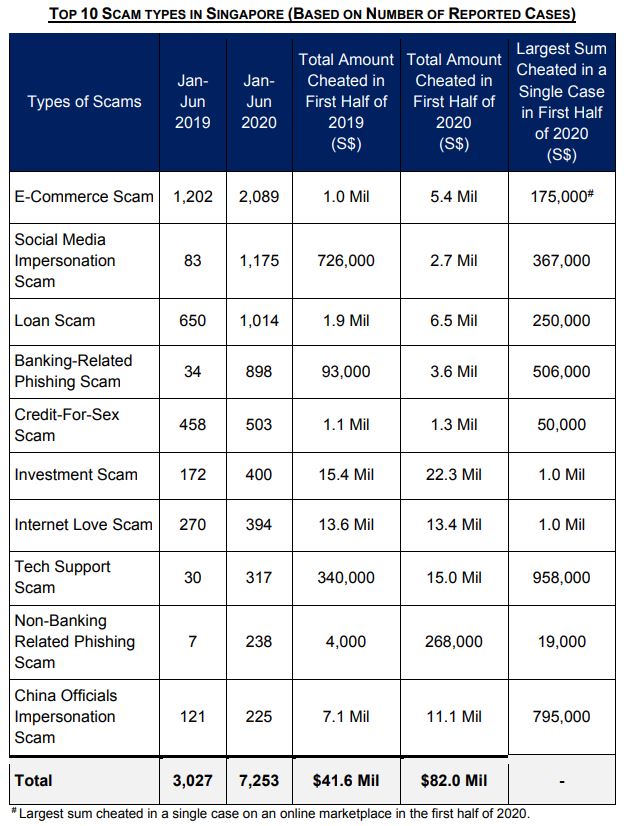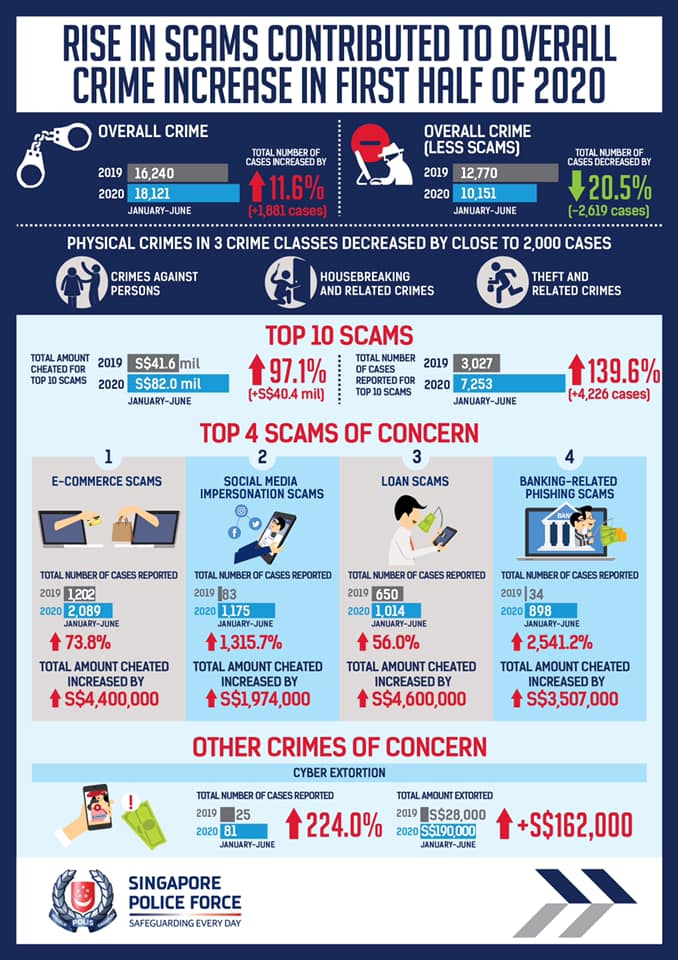Scam Cases Increase By 230% In 1st Half Of 2020, Probably Due To ‘Circuit Breaker’
If you think that you’ve seen more dubious emails, shady social media messages and sketchy deals over the Internet lately, you’re right.
More scam cases were reported in the 1st half of 2020, compared to the 1st half of 2019, and it’s probably due to the ‘Circuit Breaker’.
In fact, the number of scams increased by 230%, and victims were cheated of a total of $82 million in the top 10 scams reported.
The Singapore Police Force revealed these statistics in a Facebook post on Wednesday (26 Aug), noting that there was an overall rise in crime in the 1st 6 months of 2020 compared with the same period last year.
Scams the reason for overall rise in crime
The total number of criminal cases rose by 11.6% — but mainly because of the astounding rise in scam cases.
If we take out the scams from the total number of crimes, Singapore actually saw a decrease of 20.5% in the number of criminal cases reported.
Physical crimes in 3 categories went down by almost 2,000 cases — crimes against persons, housebreaking and theft, as well as offences related to these crimes.
More than 2 times the number of scams in 2020 1st half
The number of scams reported in the 1st half of 2020 was 7,970, according to the police statistics.
Compared with the figure of 3,470 for 2019, that’s a 230% increase, or more than 2 times.
$82 million cheated in top 10 scam types
Victims were cheated of a total of $82 million by falling for 1 of the top 10 types of scams, the police said.
This is double the $41.6 million cheated in the 1st half of 2019.
The top 4 types of scams are:
- E-commerce scams
- Social media impersonation scams
- Loan scams
- Banking-related phishing scams
These 4 types of scams comprised 71% of the top 10 scams, with $18.2 million lost.
5,176 of the top 4 scams were reported, 163% more than in the same period last year.
Here’s the breakdown of the top 10 scams in Singapore and how much victims were cheated of in 2020, compared with the same period in 2019.
E-commerce the most common scam
Just like in 2019, e-commerce is the No. 1 type of scam reported this year.
2,089 e-commerce scams were reported — an increase of 73.8% from last year.
Victims lost a total of $5.4 million, with the largest sum lost in a single case being $175,000.
In the 1st half of 2019, only $1 million was lost of online marketplace scams.
The police named digital platforms like Carousell, Shopee, Facebook and Lazada as seeing increases in scams.
Social media, banking scams increased significantly
The police also recorded a significant increase in scams involving social media impersonation banking-related phishing.
For social media scams, 1,175 were reported, compared with just 83 in 2019.
Most of these cases happened on Instagram or Facebook, with victims tricked into disclosing personal data like phone numbers, credit card info and One-Time Passwords (OTPs) to scammers posing as friends or followers.
For banking scams, the number of cases went up to 898 from just 34 in in 2019.
Most of these cases happened over IMO, Viber and WhatsApp, and victims were tricked into revealing Internet banking usernames, Personal Identification Numbers and OTPs to scammers posing as bank staff.
Here’s a graphic summarising the important points made by the police. For a more comprehensive report, check out the full statement.
Covid-19 led to more scams
The sharp increase in scams in the 1st half of this can be attributed to the Covid-19 pandemic.
The resulting ‘Circuit Breaker’ that caused more Singaporeans to stay indoors undoubtedly led to more shopping online from home, said the police.
In a reflection of the times, 294 scams reported involved Covid-19-related items such as face masks, hand sanitisers and thermometers.
Electronic and gaming-related items were also linked to more scams, as Singaporeans stayed at home and indulged more often in home entertainment.
However, it can also be argued that were it not for the ‘Circuit Breaker’, physical crimes wouldn’t have decreased to such a large degree.
Beware of scams
The massive amounts of money that victims have lost will warn you to be vigilant against scams.
Remember not to give out your personal details to just anybody, and always go by the motto: If something seems too good to be true, it probably is.
Be careful out there in the wild wild world of the Internet.
Featured image from rupixen.com @ Unsplash.













